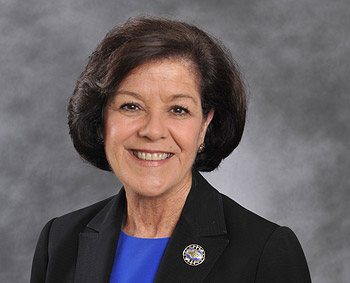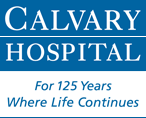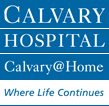FAQ – Understanding Hospice

Vice President of Community Patient Services
“What a wonderful gift families give their loved ones by helping them be at home as long as possible and, quite often, until the end of life.”
Q. Home care, hospice care, hospital care – what’s the difference?
The primary difference is the goal of care. People come into a traditional home care program like Calvary’s Certified Home Health Agency to get better after a serious illness or surgery. So, they might still be receiving chemotherapy, blood transfusions or diagnostic tests in pursuit of a cure. Sometimes, we’re helping our home care patients recover from an acute episode. Sometimes, we’re helping them stabilize before choosing hospice.
Hospice is a philosophy of end-of-life care rather than a physical place. Patients with a life-limiting illness, who are no longer pursuing treatment and want to spend their final days at peace and in comfort, are candidates for hospice care. Our goal is to give patients and their caregivers as much support as possible so they can live their life how they want, where they want – in a patient’s or family member’s home, in a nursing home, even in a hospital.
And then, sometimes a patient’s needs are so complex, they need more than can be managed at home – no matter the depth of love and devotion of their family. These are patients who should be seen daily by a physician, who need 24-hour attendance by nurses, who need services that can really only be provided in an acute care hospital setting. Calvary Hospital is the only fully accredited acute care hospital in the country exclusively dedicated to delivering this level of palliative care.
Q. So hospice services can be provided both at home and in a hospital setting?
Absolutely. And a patient can enter our “continuum of care” at any point. One of the scary things for so many people who come to Calvary is their fear that they will make the wrong choice. But there is no wrong choice at Calvary. For example, a patient enters Calvary as an inpatient, and then can feel well enough to be cared for at home. Conversely, a home hospice patient can seamlessly become a Calvary inpatient without any interruption in care. For so many of our families, just knowing that their loved one can be admitted to Calvary Hospital and Ozanam Hall inpatient unit in Bayside, Queens at any time gives them security and confidence to provide Calvary Hospice care at home. This is why it was imperative that we opened the Dawn Greene Hospice and why we’ve expanded it again and again. Every hospice must be able to offer inpatient level of care, and we wanted our Manhattan families to have convenient access to all that is wonderful about Calvary Hospital, which they have at Dawn Greene Hospice at Mary Manning Walsh Home.
Q. Why is it a choice? Doesn’t a medical team dictate what a patient needs?
No, the patient does, and the family. It’s their choice. That’s why it’s so important that a patient completes a living will and appoints a healthcare proxy. Does your loved one want antibiotics? Do they want to be resuscitated, to be intubated? Do they want to be cared for in a hospital or at home? And who in their family do they want to speak for them? It is extremely helpful when these decisions are made early and a plan can be put in place.
Q. How does home hospice care differ from hospital care?
The biggest difference is that when a patient is in the hospital, the nursing staff cares for them. When a patient is at home, the hospice staff partners with the family to ensure that patient care needs are met. That’s a big job for the caregivers, but it’s one they’re willing to take on as a final gift to someone dear who has asked to be at home. Our hospice team helps shoulder the burden by providing equipment, medication management, and round-the-clock access to medical professionals. Nurses visit as needed, more in the beginning – and at the end. Families also receive the help of the full hospice team, including doctors, nurse practitioners, social workers, pastoral care counselors, music therapy, physical therapy and bereavement support. Ours is a vital supporting role, allowing the families to be the true heroes.
Q. Does Calvary help the family with issues outside of care, like insurance reimbursement?
We’re here to help our patients get the full amount of care to which they are entitled. Standing up against the ignorance and obstinacies of the HMOs and insurance agencies is tough – but we know how. All too often we encounter a case manager stationed in some city on the other side of the country, who has never experienced a death in the family, who reflexively says “no.” But when we have to get an authorization, we don’t take no for an answer. So we advocate for our families – and we teach them to advocate for themselves. This is a battle we’re always proud to fight when our patients’ care is at stake.
Q. What are your goals for Calvary Hospice?
People know of Calvary, and they equate our name with the best possible care for those who are at the very end of life. We see it in the number of healthcare professionals in the New York City area who refer their loved ones to us. I believe that Calvary’s renowned reputation will continue to help expand recognition and appreciation of our exceptional hospice program throughout the entire region for the benefit of so many families who need CalvaryCare®.
“Donor support is vital to the quality of our care and our commitment to keep our nurse-to-patient ratio low, and our attention to patient and family needs high. Thank you for your help!”
Categories
Archives
- June 2025
- May 2025
- April 2025
- March 2025
- February 2025
- October 2024
- August 2024
- July 2024
- May 2024
- April 2024
- March 2024
- February 2024
- December 2023
- November 2023
- October 2023
- August 2023
- July 2023
- June 2023
- May 2023
- April 2023
- March 2023
- January 2023
- December 2022
- October 2022
- August 2022
- July 2022
- June 2022
- April 2022
- March 2022
- February 2022
- January 2022
- October 2021
- September 2021
- August 2021
- July 2021
- June 2021
- May 2021
- April 2021
- March 2021
- February 2021
- December 2020
- November 2020
- October 2020
- September 2020
- August 2020
- July 2020
- May 2020
- April 2020
- March 2020
- February 2020
- January 2020
- December 2019
- November 2019
- October 2019
- September 2019
- August 2019
- July 2019
- May 2019
- April 2019
- March 2019
- February 2019
- January 2019
- December 2018
- November 2018
- October 2018
- September 2018
- August 2018
- July 2018
- June 2018
- May 2018
- April 2018
- December 2017
- November 2017
- October 2017
- September 2017
- August 2017
- July 2017
- June 2017
- May 2017
- April 2017
- April 2012

